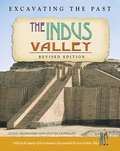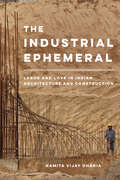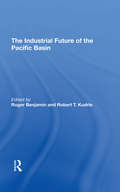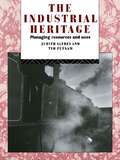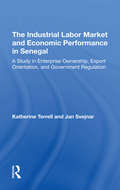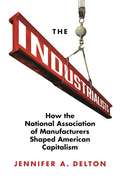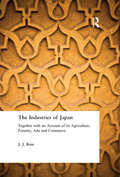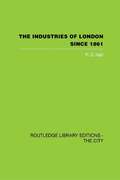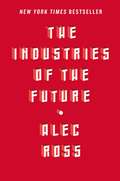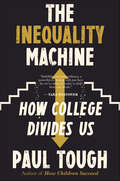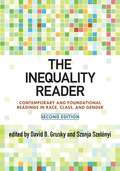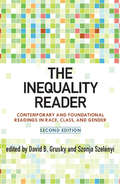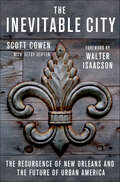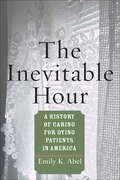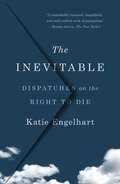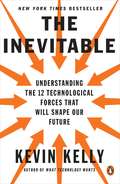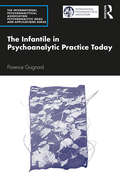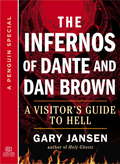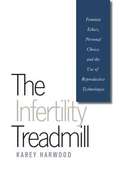- Table View
- List View
The Indus Valley (Excavating The Past Series #Revised Edition)
by Ilona Aronovsky Sujata GopinathContents include: The Lost Cities of the Indus Civilization; Constructing Great Cities (The cities of the rivers, Monumental Mohenjo-daro, An Indus Valley home, Excavating Harappa, Dholavira); Clues to Daily Living (Jobs, Figuring out figurines, Food and cooking); The Mystery of the Indus Script; Traveling Far and Wide; Craft Technology and the Art of Fire; The Rulers and People; The End of the Indus Civilization; Archaeology Today; Timelines.
The Industrial Ephemeral: Labor and Love in Indian Architecture and Construction (Atelier: Ethnographic Inquiry in the Twenty-First Century #7)
by Namita Vijay DhariaWhat transformative effects does a multimillion-dollar industry have on those who work within it? The Industrial Ephemeral presents the untold stories of the people, politics, and production chains behind architecture, real estate, and construction in areas surrounding New Delhi, India. The personal histories of those in India's large laboring classes are brought to life as Namita Vijay Dharia discusses the aggressive environmental and ecological metamorphosis of the region in the twenty-first century. Urban planning and architecture are messy processes that intertwine migratory pathways, corruption politics, labor struggle, ecological transformations, and technological development. Rampant construction activity produces an atmosphere of ephemerality in urban regions, creating an aesthetic condition that supports industrial political economy. Dharia's brilliant analysis of the sensibilities and experiences of work lends visibility to the struggle of workers in an era of growing urban inequality.
The Industrial Future Of The Pacific Basin
by Roger Benjamin Robert T KudrleThe consequences of changing comparative advantage are transforming the economic landscapes of nations and regions around the globe. This book deals with the most significant economic factors in the rapidly changing Pacific Basin area. Part 1 considers the area’s changing patterns of industrial development and trade and examines the general implications of such changes for national industrial development policies. Part 2 consists of a set of case studies of national industrial policies in the context of factors affecting industrial structures; how applicable these policies are to other countries in the region is a central theme. Part 3 addresses the specific issues of foreign investment and domestic labor in relation to economic growth and industrial development in the Pacific Basin. Finally, in Part 4 institutional arrangements are suggested that would facilitate economic growth while, at the same time, mitigating the serious negative consequences of changing economic advantage. Such negative consequences are to some extent pervasive and can destabilize social and political development and endanger formal and informal alliances; nevertheless, the segment of humanity that has adequate food, clothing, and shelter is being permanently widened in the Pacific Basin.
The Industrial Geography of Israel
by Eran Razin Yehuda Gradus Shaul KrakoverIsrael's industrial geography is unique. The continuing Arab-Israeli conflict has been a primary force behind government intervention in settlement patterns, and has led to a major effort to disperse industry. The geopolitical situation has also encouraged a policy of attempted self-reliance, especially for defence purposes. These factors, combined with an abundant human capital, have given Israeli high-technology industries a special place in the international division of labour. The absorption of waves of mass immigration has influenced industrial development. Rural industrialisation, mainly by the Kibbutz (communal settlement) movement, is another unique feature. The Industrial Geography of Israel presents a comprehensive overview of industrial spatial development of Israel from the Ottoman era to present times, evaluating industrial dispersal policy, corporate geography, high-technology industries, entrepreneurship and rural industrial development. The spatial development of Israeli industry is set within the broader context of Israel's political and economic development and of global economic change, as well as theories of industrial location and regional planning and development.
The Industrial Geography of Italy (Routledge Library Editions: Economic Geography)
by Russell KingAt the time this book was originally published in 1985 Italy was one of Europe’s leading industrial nations. This volume provides a comprehensive overview of Italian industry during the 1980s. It introduces Italy’s physical and human resources and outlines the historical development of the industry. It then examines the major sectors of Italian industry and then describes the different regions of the country and the striking differences between them are explored and discussed.
The Industrial Heritage: Managing Resources and Uses (Heritage: Care-Preservation-Management)
by Judith Alfrey Tim PutnamThe Industrial Heritage is the first integrated approach to the assessment, conservation, interpretation, financing and management of the complex heritage of industrial cultures. It breaks new ground, as the authors (both active workers in the field) suggest that concepts of heritage defined to deal with pre-industrial cultures must be modified to deal with the very different demands presented by industrial objects and the societies which produced them. The essence of this book is practicality, offering examples of the real issues which confront those concerned with preserving and managing the industrial heritage.
The Industrial Labor Market And Economic Performance In Senegal: A Study In Enterprise Ownership, Export Orientation, And Government Regulations
by Jan Svejnar Katherine TerrellThis book examines Senegal's industrial labor market and relates its principal features, together with the structure of enterprise ownership and government policies, to the country's economic performance. It explores the relationship between industrial wages and the size of the extended family.
The Industrial Revolution in World History
by Peter N. StearnsNow in its fifth edition, this book explores the ways in which the industrial revolution reshaped world history, covering the international factors that helped launch the industrial revolution, its global spread and its impact from the end of the eighteenth century to the present day. The single most important development in human history over the past three centuries, the industrial revolution continues to shape the contemporary world. Revised and brought into the present, this fifth edition of Peter N. Stearns’ The Industrial Revolution in World History extends his global analysis of the industrial revolution. Looking beyond the West, the book considers India, the Middle East and China and now includes more on key Latin American economies and Africa as well as the heightened tensions, since 2008, about the economic aspects of globalization and the decline of manufacturing in the West. This edition also features a new chapter on key historiographical debates, updated suggestions for further reading and boxed debate features that encourage the reader to consider diversity and different viewpoints in their own analysis, and pays increased attention to the environmental impacts. Illustrating the contemporary relevance of the industrial revolution's history, this is essential reading for students of world history and economics, as well as for those seeking to know more about the global implications of what is arguably the defining socioeconomic event of modern times.
The Industrial Structure of American Cities (Routledge Library Editions: Economic Geography)
by Gunnar AlexanderssonThis book analyzes the distribution of the urban population in an industrialized country. The USA was chosen as the object of the study because it had, at the time of writing, in 1956, the largest population for which homogeneous and comparable statistics were available. The first step in the quantitative analysis of population distribution, according to the method suggested here, is the breaking up of the total population into its components: the industries in which people earn their living. Extensive maps support the text as it discusses the problem of industrial location which has attracted much attention from geographers and economists.
The Industrialists: How the National Association of Manufacturers Shaped American Capitalism (Politics and Society in Modern America #138)
by Jennifer A. DeltonThe first complete history of US industry's most influential and controversial lobbyistFounded in 1895, the National Association of Manufacturers—NAM—helped make manufacturing the basis of the US economy and a major source of jobs in the twentieth century. The Industrialists traces the history of the advocacy group from its origins to today, examining its role in shaping modern capitalism, while also highlighting the many tensions and contradictions within the organization that sometimes hampered its mission.In this compelling book, Jennifer Delton argues that NAM—an organization best known for fighting unions, promoting "free enterprise," and defending corporate interests—was also surprisingly progressive. She shows how it encouraged companies to adopt innovations such as safety standards, workers' comp, and affirmative action, and worked with the US government and international organizations to promote the free exchange of goods and services across national borders. While NAM's modernizing and globalizing activities helped to make American industry the most profitable and productive in the world by midcentury, they also eventually led to deindustrialization, plant closings, and the decline of manufacturing jobs.Taking readers from the Progressive Era and the New Deal to the Reagan Revolution and the Trump presidency, The Industrialists is the story of a powerful organization that fought US manufacturing's political battles, created its economic infrastructure, and expanded its global markets—only to contribute to the widespread collapse of US manufacturing by the close of the twentieth century.
The Industries of Japan: Together with an Account of its Agriculture, Forestry, Arts and Commerce
by J. J. ReinFirst published in 1889, this facsimile edition makes available an important historical work on Japanese industry. It is a comprehensive survey of the state of Japanese industry at the end of the nineteenth century, covering agriculture and forestry, mining, the arts, textiles, paper, trade and commerce, including the foreign trade of Japan since the opening of the country by Commodore Perry in 1854.
The Industries of London Since 1861
by P.G. HallHall argues that 'London was the chief manufacturing centre of the country in 1861, and without doubt for centuries before that'. This book looks at industries in London over time from 1861. This book was first published in 1962.
The Industries of the Future
by Alec RossThis book answers the question: 'What's next?' The Internet had a world-changing impact on businesses and the global community over the twenty years from 1994 to 2014. In the next ten years, change will happen even faster. As Hillary Clinton's Senior Advisor for Innovation, Alec Ross travelled nearly a million miles to forty-one countries, the equivalent of two round-trips to the moon. From refugee camps in the Congo and Syrian war zones, to visiting the world's most powerful people in business and government, Ross's travels amounted to a four-year masterclass in the changing nature of innovation. In The Industries of the Future, Ross distils his observations on the forces that are changing the world. He highlights the best opportunities for progress and explains how countries thrive or sputter. Ross examines the specific fields that will most shape our economic future over the next ten years, including robotics, artificial intelligence, the commercialization of genomics, cybercrime and the impact of digital technology. Blending storytelling and economic analysis, he answers questions on how we will need to adapt. Ross gives readers a vivid and informed perspective on how sweeping global trends are affecting the ways we live, now and tomorrow.
The Industries of the Future
by Alec RossThe New York Times bestseller, from leading innovation expert Alec Ross, a “fascinating vision” (Forbes) of what’s next for the world and how to navigate the changes the future will bring.While Alec Ross was working as Senior Advisor for Innovation to the Secretary of State, he traveled to forty-one countries, exploring the latest advances coming out of every continent. From startup hubs in Kenya to R&D labs in South Korea, Ross has seen what the future holds. In The Industries of the Future, Ross provides a “lucid and informed guide” (Financial Times) to the changes coming in the next ten years. He examines the fields that will most shape our economic future, including robotics and artificial intelligence, cybercrime and cybersecurity, the commercialization of genomics, the next step for big data, and the impact of digital technology on money and markets. In each of these realms, Ross addresses the toughest questions: How will we have to adapt to the changing nature of work? Is the prospect of cyberwar sparking the next arms race? How can the world’s rising nations hope to match Silicon Valley with their own innovation hotspots? And what can today’s parents do to prepare their children for tomorrow? Ross blends storytelling and economic analysis to show how sweeping global trends are affecting the ways we live. Sharing insights from global leaders—from the founders of Google and Twitter to defense experts like David Petraeus—Ross reveals the technologies and industries that will drive the next stage of globalization. The Industries of the Future is “a riveting and mind-bending book” (New York Journal of Books), a “must read” (Wendy Kopp, Founder of Teach for America) regardless of “whether you follow these fields closely or you still think of Honda as a car rather than a robotics company” (Forbes).
The Inequality Machine: How College Divides Us
by Paul ToughFirst published as The Years That Matter MostFrom best-selling author Paul Tough, an indelible and explosive book on the glaring injustices of higher education, including unfair admissions tests, entrenched racial barriers, and crushing student debt. Now updated and expanded for the pandemic era. When higher education works the way it&’s supposed to, there is no better tool for social mobility—for lifting young people out of challenging circumstances and into the middle class and beyond. In reality, though, American colleges and universities have become the ultimate tool of social immobility—a system that secures a comfortable future for the children of the wealthy while throwing roadblocks in the way of students from struggling families. Combining vivid and powerful personal stories with deep, authoritative reporting, Paul Tough explains how we got into this mess and explores the innovative reforms that might get us out. Tough examines the systemic racism that pervades American higher education, shows exactly how the SATs give an unfair advantage to wealthy students, and guides readers from Ivy League seminar rooms to the welding shop at a rural community college. At every stop, he introduces us to young Americans yearning for a better life—and praying that a college education might help them get there. With a new preface and afterword by the author exposing how the coronavirus pandemic has shaken the higher education system anew.
The Inequality Reader: Contemporary and Foundational Readings In Race, Class, and Gender
by David Grusky Szonja SzelenyiOriented toward the introductory student, The Inequality Reader is the essential textbook for today's undergraduate courses. The editors, David B. Grusky and Szonja Szelényi, have assembled the most important classic and contemporary readings about how poverty and inequality are generated and how they might be reduced. With thirty new readings, the second edition provides new materials on anti-poverty policies as well as new qualitative readings that make the scholarship more alive, more accessible, and more relevant. Now more than ever, The Inequality Reader is the one-stop compendium of all the must-read pieces, simply the best available introduction to the stratification canon.
The Inequality Reader: Contemporary and Foundational Readings in Race, Class, and Gender
by David GruskyOriented toward the introductory student, The Inequality Reader is the essential textbook for today's undergraduate courses. The editors, David B. Grusky and Szonja Szel?i, have assembled the most important classic and contemporary readings about how poverty and inequality are generated and how they might be reduced. With thirty new readings, the second edition provides new materials on anti-poverty policies as well as new qualitative readings that make the scholarship more alive, more accessible, and more relevant. Now more than ever, The Inequality Reader is the one-stop compendium of all the must-read pieces, simply the best available introduction to the stratifi cation canon.
The Inevitable City: The Resurgence of New Orleans and the Future of Urban America
by Betsy Seifter Scott CowenAfter seven years of service as the president of Tulane University, Scott Cowen watched the devastation of his beloved New Orleans at the hands of Hurricane Katrina. When federal, state, and city officials couldn't find their way to decisive action, Cowen, known for his gutsy leadership, quickly partnered with a coalition of civic, business, and nonprofit leaders looking to work around the old institutions to revitalize and transform New Orleans. This team led the charge to restore equilibrium and eventually to rebuild. For the past nine years, Cowen has continued this work, helping to bring the city of New Orleans back from the brink. The Inevitable City presents 10 principles that changed the game for this city, and, if adopted, can alter the curve for any business, endeavor, community—and perhaps even a nation.This is the story of the resurgence and reinvention of one of America's greatest cities. Ordinary citizens, empowered to actively rescue their own city after politicians and government officials failed them, have succeeded in rebuilding their world. Cowen was at the leading edge of those who articulated, shaped, and implemented a vision of transformative change that has yielded surprising social progress and economic growth: a drowned city identified with the shocking images of devastation and breakdown has transformed itself into a mecca of growth, opportunity, and hope.
The Inevitable Hour: A History of Caring for Dying Patients in America
by Emily K. AbelChanges in health care have dramatically altered the experience of dying in America.At the turn of the twentieth century, medicine’s imperative to cure disease increasingly took priority over the demand to relieve pain and suffering at the end of life. Filled with heartbreaking stories, The Inevitable Hour demonstrates that professional attention and resources gradually were diverted from dying patients. Emily K. Abel challenges three myths about health care and dying in America. First, that medicine has always sought authority over death and dying; second, that medicine superseded the role of families and spirituality at the end of life; and finally, that only with the advent of the high-tech hospital did an institutional death become dehumanized. Abel shows that hospitals resisted accepting dying patients and often worked hard to move them elsewhere. Poor, terminally ill patients, for example, were shipped from Bellevue Hospital in open boats across the East River to Blackwell’s Island, where they died in hovels, mostly without medical care. Some terminal patients were not forced to leave, yet long before the advent of feeding tubes and respirators, dying in a hospital was a profoundly dehumanizing experience.With technological advances, passage of the Social Security Act, and enactment of Medicare and Medicaid, almshouses slowly disappeared and conditions for dying patients improved—though, as Abel argues, the prejudices and approaches of the past are still with us. The problems that plagued nineteenth-century almshouses can be found in many nursing homes today, where residents often receive substandard treatment. A frank portrayal of the medical care of dying people past and present, The Inevitable Hour helps to explain why a movement to restore dignity to the dying arose in the early 1970s and why its goals have been so difficult to achieve.
The Inevitable: Dispatches on the Right to Die
by Katie EngelhartA riveting, incisive, and wide-ranging book about the Right to Die movement, and the doctors, patients, and activists at the heart of this increasingly urgent issue. More states and countries are passing right-to-die laws that allow the sick and suffering to end their lives at pre-planned moments, with the help of physicians. But even where these laws exist, they leave many people behind. The Inevitable moves beyond margins of the law to the people who are meticulously planning their final hours—far from medical offices, legislative chambers, hospital ethics committees, and polite conversation. It also shines a light on the people who help them: loved ones and, sometimes, clandestine groups on the Internet that together form the “euthanasia underground.”Katie Engelhart, a veteran journalist, focuses on six people representing different aspects of the right to die debate. Two are doctors: a California physician who runs a boutique assisted death clinic and has written more lethal prescriptions than anyone else in the U.S.; an Australian named Philip Nitschke who lost his medical license for teaching people how to end their lives painlessly and peacefully at “DIY Death” workshops. The other four chapters belong to people who said they wanted to die because they were suffering unbearably—of old age, chronic illness, dementia, and mental anguish—and saw suicide as their only option. Spanning North America, Europe, and Australia, The Inevitable offers a deeply reported and fearless look at a morally tangled subject. It introduces readers to ordinary people who are fighting to find dignity and authenticity in the final hours of their lives.
The Inevitable: Understanding the 12 Technological Forces That Will Shape Our Future
by Kevin Kelly<P>From one of our leading technology thinkers and writers, a guide through the twelve technological imperatives that will shape the next thirty years and transform our lives. <P>Much of what will happen in the next thirty years is inevitable, driven by technological trends that are already in motion. In this fascinating, provocative new book, Kevin Kelly provides an optimistic road map for the future, showing how the coming changes in our lives--from virtual reality in the home to an on-demand economy to artificial intelligence embedded in everything we manufacture--can be understood as the result of a few long-term, accelerating forces. <P>Kelly both describes these deep trends--interacting, cognifying, flowing, screening, accessing, sharing, filtering, remixing, tracking, and questioning--and demonstrates how they overlap and are codependent on one another. These larger forces will completely revolutionize the way we buy, work, learn, and communicate with each other. <P>By understanding and embracing them, says Kelly, it will be easier for us to remain on top of the coming wave of changes and to arrange our day-to-day relationships with technology in ways that bring forth maximum benefits. <P>Kelly's bright, hopeful book will be indispensable to anyone who seeks guidance on where their business, industry, or life is heading--what to invent, where to work, in what to invest, how to better reach customers, and what to begin to put into place--as this new world emerges <P><b>A New York Times Bestseller</b>
The Infantile in Psychoanalytic Practice Today (The International Psychoanalytical Association Psychoanalytic Ideas and Applications Series)
by Florence GuignardThe Infantile in Psychoanalytic Practice Today demonstrates the concept of the Infantile, first proposed almost a quarter of a century ago, and the ways in which it has become an indispensable tool in contemporary psychoanalytic clinical practice. As a “concept of the third type”, the Infantile makes the “links-between-the-links” woven into the transference/countertransference functional and effective with patients of all ages, and is related to the double helix between infant neurosis and transference neurosis as revealed by Freud. The author proposes the Infantile as a key concept in the psychic organization of every human being, as the unconscious internal space that includes both the repressed elements of the past and the constantly renewed expressions of the drives. As a unique and dynamic configuration for each person, the book explores the way this relates to others, to the environment, and also to the individual’s own psychic contents and movements. This eagerly awaited English edition includes two new chapters, filling a gap in the psychoanalytic library. As a concept with international scope, these writings on the Infantile will be essential reading for psychoanalysts working today and all those interested in the history of psychoanalysis.
The Infernos of Dante and Dan Brown
by Gary JansenAn extraordinary journey into the signs and symbols behind Dan Brown's new Robert Langdon thriller, Inferno. Just in time for Dan Brown's new novel, this short guide introduces readers to Dante Alighieri's fourteenth-century epic poem Inferno and explores how Brown uses Dante's imagery and symbols in his latest Robert Langdon thriller. The Infernos of Dante and Dan Brown: A Visitor's Guide to Hell answers the questions and illuminates the facts behind Brown's historical puzzles, cryptic clues, and plot twists. It allows every reader to immerse himself more deeply into Robert Langdon's world. Author Gary Jansen is an independent scholar of Dante's work and a critically acclaimed writer on modern religion. In addition to providing an inside perspective on how Dan Brown uses the uncanny and remarkable themes of Dante, Jansen presents a reliable and engaging overview of the Middle Ages poet and his work. The Infernos of Dante and Dan Brown is an all-around resource into the religious themes, historical secrets, and beguiling imagery behind this breathtaking new thriller.
The Infertility Treadmill: Feminist Ethics, Personal Choice, and the Use of Reproductive Technologies
by Karey HarwoodCombining attention to lived experience with the critical tools of ethics, Karey Harwood explores why many women who use high-tech assisted reproduction methods tend to use them repeatedly, even when the results are unsuccessful. With a compassionate look at the individual decision making behind the desire to become pregnant and the use of assisted reproductive technologies (ART), Harwood extends the public conversation beyond debates about individual choice by considering the experiences of families and by addressing the broader ethical problems presented by these technologies.
The Infidel and the Professor: David Hume, Adam Smith, and the Friendship That Shaped Modern Thought
by Dennis C. RasmussenThe story of the greatest of all philosophical friendships—and how it influenced modern thoughtDavid Hume is widely regarded as the most important philosopher ever to write in English, but during his lifetime he was attacked as “the Great Infidel” for his skeptical religious views and deemed unfit to teach the young. In contrast, Adam Smith was a revered professor of moral philosophy, and is now often hailed as the founding father of capitalism. Remarkably, the two were best friends for most of their adult lives, sharing what Dennis Rasmussen calls the greatest of all philosophical friendships. The Infidel and the Professor is the first book to tell the fascinating story of the friendship of these towering Enlightenment thinkers—and how it influenced their world-changing ideas.The book follows Hume and Smith’s relationship from their first meeting in 1749 until Hume’s death in 1776. It describes how they commented on each other’s writings, supported each other’s careers and literary ambitions, and advised each other on personal matters, most notably after Hume’s quarrel with Jean-Jacques Rousseau. Members of a vibrant intellectual scene in Enlightenment Scotland, Hume and Smith made many of the same friends (and enemies), joined the same clubs, and were interested in many of the same subjects well beyond philosophy and economics—from psychology and history to politics and Britain’s conflict with the American colonies. The book reveals that Smith’s private religious views were considerably closer to Hume’s public ones than is usually believed. It also shows that Hume contributed more to economics—and Smith contributed more to philosophy—than is generally recognized.Vividly written, The Infidel and the Professor is a compelling account of a great friendship that had great consequences for modern thought.
